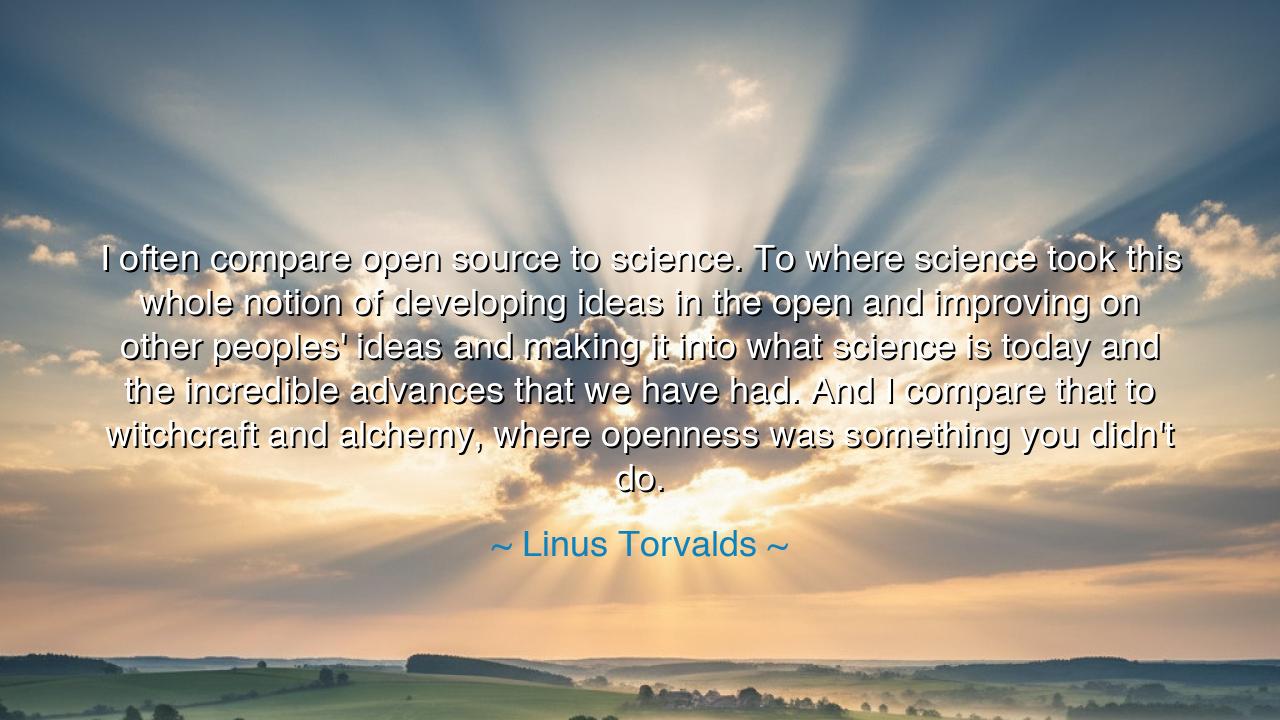
I often compare open source to science. To where science took
I often compare open source to science. To where science took this whole notion of developing ideas in the open and improving on other peoples' ideas and making it into what science is today and the incredible advances that we have had. And I compare that to witchcraft and alchemy, where openness was something you didn't do.






Hear, O Seekers of Truth, the words of Linus Torvalds, who draws a powerful comparison between the open source movement and the great tradition of science, and in doing so, illuminates the profound wisdom of openness in the pursuit of knowledge. "I often compare open source to science. To where science took this whole notion of developing ideas in the open and improving on other peoples' ideas and making it into what science is today and the incredible advances that we have had. And I compare that to witchcraft and alchemy, where openness was something you didn't do." In these words, Torvalds speaks to a fundamental shift in how knowledge is shared and developed—a shift that mirrors the great transformations in human understanding that have shaped the course of history.
Consider, O Seekers, the ancient world, where knowledge was often guarded as a mystery, a treasure locked away from the common people. In the age of alchemy, the secrets of nature were seen as arcane and esoteric, known only to a few who could unlock them through rituals and secret teachings. The alchemists, though driven by a desire to understand and manipulate the forces of the universe, kept their discoveries hidden, as if knowledge itself were something to be possessed and hoarded, rather than shared. This secrecy, born of mistrust and the desire for power, stifled progress and confined understanding to a small circle of initiates.
In contrast, science, particularly as it evolved in the works of Galileo, Newton, and later the scientific revolution, embraced the idea that knowledge was not a commodity to be hoarded, but a living force that should be shared and built upon. Galileo Galilei, through his telescope, dared to share his findings of the stars, not in secret but in the light of public scrutiny and discussion. His discoveries were not bound by the chains of secrecy but laid bare for the world to see, test, and improve upon. Newton, too, in his Principia, opened the door for others to build on his work, famously saying, “If I have seen further, it is by standing on the shoulders of giants.” The advancement of science was made possible by a culture of openness, a culture where ideas could be shared, refined, and made better by the collective effort of all.
Torvalds’ comparison between open source and science is a deep recognition of the transformative power that comes when we share our ideas, when we build upon the work of others. The open source movement, which Torvalds himself helped to pioneer with Linux, has brought this spirit of openness into the realm of technology, enabling a global community of developers to collaborate, improve, and innovate in ways that were once thought impossible. Just as science flourished when it broke free from the chains of secrecy and embraced collaboration, so too has open source driven the advancement of technology and software, creating a space where knowledge is not limited to the few, but is accessible to all.
In this, O Seekers, there is a lesson that transcends the worlds of science and technology. Openness—the willingness to share, to improve, to collaborate—is the foundation of progress. The great advances in human knowledge, whether in the realm of medicine, engineering, or philosophy, have always come when people stopped fearing the sharing of their insights and instead embraced the strength that comes from working together. Consider the medical field—vaccines and cures for diseases have progressed because of the scientific community's willingness to share findings, debate ideas, and refine approaches. These breakthroughs would not have occurred if knowledge had been kept secret, locked away in the vaults of the privileged few.
Torvalds’ insight calls us to recognize that the true power of knowledge lies not in its ownership, but in its free exchange. Whether in science, art, or technology, when we allow ideas to flow freely—when we collaborate with others to refine and improve them—progress accelerates. The open source movement and the scientific revolution alike remind us that advancement is rooted in a culture of openness, of sharing, and of mutual improvement. As human beings, we are capable of great things when we put aside ego, competition, and secrecy, and instead focus on the collective goal of understanding and innovation.
So go forth, O Seekers, with the understanding that the true power of knowledge lies in its sharing. Do not hoard your insights or ideas, but seek to share them with others, to improve them together, and to build upon them for the benefit of all. Just as science and open source have changed the world by embracing openness, so too can you, in your own life, contribute to the advancement of humanity. Let this be your guide: seek to collaborate, to share, and to build upon the ideas of others, knowing that in doing so, you are part of the never-ending march toward progress and understanding.






AAdministratorAdministrator
Welcome, honored guests. Please leave a comment, we will respond soon